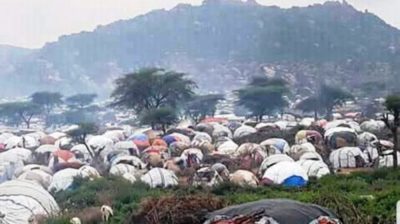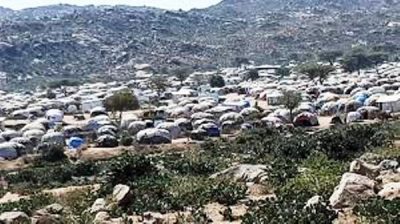As of 3 August, 17 IDPs [Internally Displaced Persons] were tested positive for COVID-19 via community testing in and around Qoloji and Gabogabo IDP [Internally Displaced People] sites [in Fafan zone], Somali region. Of the 17 confirmed cases, seven (7) cases left the site and are currently being traced. This is the first time COVID-19 cases are reported amongst IDPs. The first health professional in Qoloji IDP site also tested positive on 2 August and is currently in isolation. The DRMB and humanitarian partners agreed to set up an incident command post (ICP) to coordinate the response. The ICP will start operation on 10 August. According to data from the Displacement Tracking Matrix 22 (DTM 22), around 78,000 IDPs live in Qoloji IDP sites (Qoloji 1 and 2).
On 6 August, OCHA, UNICEF, WFP together with the Somali region Disaster Risk Management Bureau (DRMB) Director visited the Qoloji IDP sites and the designated isolation center. The team observed concerning progress in the implementation of COVID19 prevention and management efforts as mass random testing had reportedly stopped, and no contact tracing is taking place. The surveillance work had also stopped because of the rumor spreading amongst the IDPs that health workers are the source of infection. Prior to the confirmation of COVID-19 cases in the IDP sites, the local clinics used to receive more than 100 people per day; after the confirmation of the 17 cases the number of outpatients dropped to three people per day. Local community leaders said that they are facing huge challenges in their effort to carry out sensitization and awareness raising campaign because of the deep misconception and spreading falsehood.
Overall, even amongst people with good awareness on COVID-19 prevention method, adherence to mask-wearing, hand washing, and physical distancing rules is low, calling for behavior change communication techniques in COVID-19 messaging. The EOC is currently planning a week-long risk communication and community engagement campaign across the country, the dates and the content of which will soon be made public.
Although COVID-19 is primarily a health emergency, its impact is being felt across all sectors mostly amongst the vulnerable section of society.
In addition to COVID-19, Ethiopia’s humanitarian context is aggravated by severe flooding leading to livelihood loss and displacement, desert locust, new conflict displacements and other disease outbreaks.
All these, often inter-related crisis, are having a significant impact on income loss and food security. At present, the 2020 Humanitarian Response Plan mid-year review is being finalized and will capture additional humanitarian needs since the release of the 2020 HRP and the revision to the requirement made in June 2020
Source: UN OCHA ETHIOPIA
CLICK HERE for the Humanitarian Bulletin | ETHIOPIA



U dhaaf Halcelis